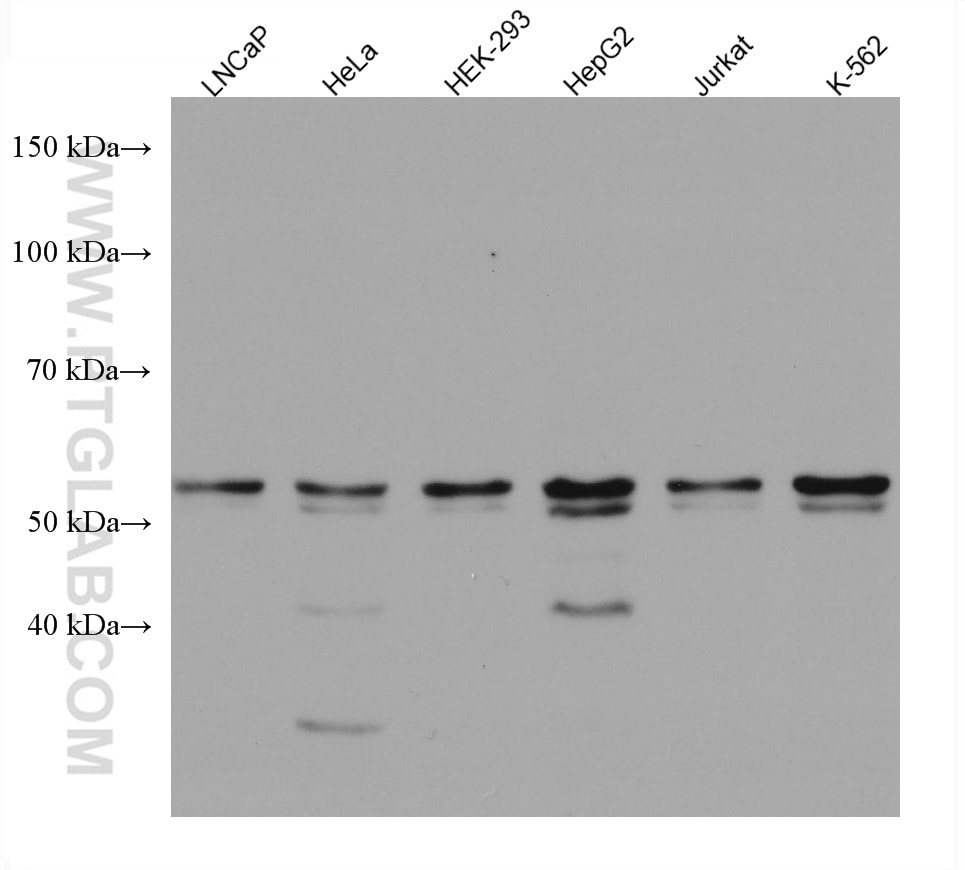Tested Applications
| Positive WB detected in | LNCaP cells, HeLa cells, HEK-293 cells, HepG2 cells, Jurkat cells, K-562 cells |
Recommended dilution
| Application | Dilution |
|---|---|
| Western Blot (WB) | WB : 1:2000-1:10000 |
| It is recommended that this reagent should be titrated in each testing system to obtain optimal results. | |
| Sample-dependent, Check data in validation data gallery. | |
Product Information
67673-1-Ig targets RNMT in WB, ELISA applications and shows reactivity with human, mouse samples.
| Tested Reactivity | human, mouse |
| Host / Isotype | Mouse / IgG1 |
| Class | Monoclonal |
| Type | Antibody |
| Immunogen |
CatNo: Ag6953 Product name: Recombinant human RNMT protein Source: e coli.-derived, PET28a Tag: 6*His Domain: 128-476 aa of BC036798 Sequence: KIALEDVPEKQKNLEEGHSSTVAAHYNELQEVGLEKRSQSRIFYLRNFNNWMKSVLIGEFLEKVRQKKKRDITVLDLGCGKGGDLLKWKKGRINKLVCTDIADVSVKQCQQRYEDMKNRRDSEYIFSAEFITADSSKELLIDKFRDPQMCFDICSCQFVCHYSFESYEQADMMLRNACERLSPGGYFIGTTPNSFELIRRLEASETESFGNEIYTVKFQKKGDYPLFGCKYDFNLEGVVDVPEFLVYFPLLNEMAKKYNMKLVYKKTFLEFYEEKIKNNENKMLLKRMQALEPYPANESSKLVSEKVDDYEHAAKYMKNSQVRLPLGTLSKSEWEATSIYLVFAFEKQQ Predict reactive species |
| Full Name | RNA (guanine-7-) methyltransferase |
| Calculated Molecular Weight | 476 aa, 55 kDa |
| Observed Molecular Weight | 55 kDa |
| GenBank Accession Number | BC036798 |
| Gene Symbol | RNMT |
| Gene ID (NCBI) | 8731 |
| RRID | AB_2918497 |
| Conjugate | Unconjugated |
| Form | Liquid |
| Purification Method | Protein G purification |
| UNIPROT ID | O43148 |
| Storage Buffer | PBS with 0.02% sodium azide and 50% glycerol, pH 7.3. |
| Storage Conditions | Store at -20°C. Stable for one year after shipment. Aliquoting is unnecessary for -20oC storage. 20ul sizes contain 0.1% BSA. |
Background Information
RNMT, also named as mRNA cap guanine-N7 methyltransferase or KIAA0398, is a 476 amino acid protein, which contains one mRNA cap 0 methyltransferase domain and belongs to the class I-like SAM-binding methyltransferase superfamily. mRNA cap 0 methyltransferase family. RNMT localizes in the nucleus and is widely expressed in various tissues. RNMT as a mRNA-capping methyltransferase that methylates the N7 position of the added guanosine to the 5'-cap structure of mRNAs and binds RNA containing 5'-terminal GpppC.
Protocols
| Product Specific Protocols | |
|---|---|
| WB protocol for RNMT antibody 67673-1-Ig | Download protocol |
| Standard Protocols | |
|---|---|
| Click here to view our Standard Protocols |




